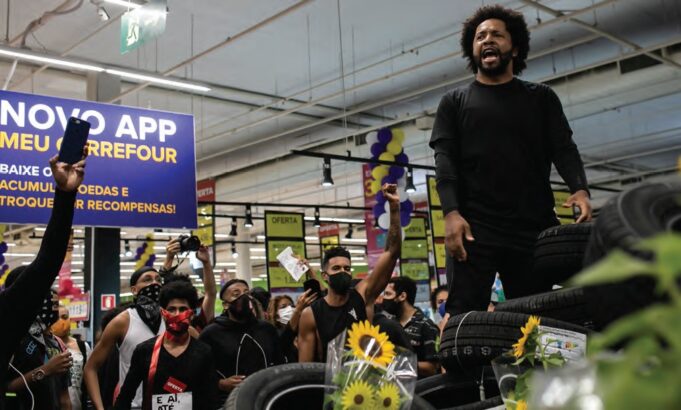BRASILIA, Brazil—A Black man who died while being beaten by supermarket security guards was buried following protests that echoed those of the racial justice movement in the United States.
Joao Alberto Silveira Freitas, a father of four, was buried wearing a white T-shirt in a coffin draped with the flag of his favorite soccer team in the city of Porto Alegre.
“I just want justice,” his partner, Milena Borges Alves, told Globo news. “That’s all. I just want them to pay for what they did to him.”
She said they had planned to formally marry in a few days after living together for nine years.
Demonstrators enraged by Mr. Freitas’ death painted “Black lives matter” on the pavement of Paulista Avenue, one of the most famous in Sao Paulo, following a series of protests across the country, many of them at branches of the Carrefour supermarket chain.
Some protests continued Nov. 21, the day the victim was buried. Military police used pepper spray to disperse demonstrators outside a supermarket in the northeastern city of Recife.
The outrage was fed by a widely circulated video showing one guard restraining Mr. Freitas as another hit him repeatedly in the face. Another clip later showed a guard kneeling atop Mr. Freitas’ back in the parking lot of the store in Porto Alegre.

On Nov. 21, a political movement that had backed conservative President Jair Bolsonaro tweeted a video that appeared to be from earlier in the confrontation, showing the two guards escorting Mr. Freitas out of the store without touching him when he suddenly punched one of them, and both then grabbed him.
Both of the guards were detained and face possible homicide charges, according to police authorities.
The France-based CEO of the Carrefour supermarket group, Alexandre Bompard, sent tweets calling the video images “unbearable” and vowing to go beyond the “insufficient” steps already taken by the company’s Brazil branch.
“My values and the values of Carrefour are not compatible with racism and violence,” he said.
Carrefour earlier said it would end its contract with the security company and fire the store manager who was on duty.
President Bolsonaro made no direct reference to the case. But in a video speech to the G-20 Summit, he denied Brazil suffers from racism and complained of an unspecified movement seeking to “divide” Brazilians.
“As a man and as president, I see everyone in the same colors: (the Brazilian flag’s) green and yellow! There is no better skin color than the others. What exists are good men and bad men; and it is our choices and values that will determine which of the two we will be.”
His son Eduardo, however, sent a social media post accusing Brazilian leftists of using Mr. Freitas as “their George Floyd,” a reference to the Black man whose death at the hands of police set off protests this year across the United States.
The president of the Locomotiva Research Institute, Renato Meirelles, said that cases like Mr. Freitas’ death “are a trigger for discontent.”
“Unfortunately, in Brazil, the Black man suffers from inequality and these things happen on a daily basis,” he told The Associated Press.
The institute was involved in a recent survey showing that Brazilians overwhelmingly believe Black people are more likely than Whites to experience violence or death at the hands of police.
Black and mixed-race people account for about 57 percent of Brazil’s population but constitute 74 percent of victims of lethal violence, according to the Brazilian Forum on Public Safety, a nongovernmental organization. The percentage is even higher, 79 percent, for those killed by police. (AP)













